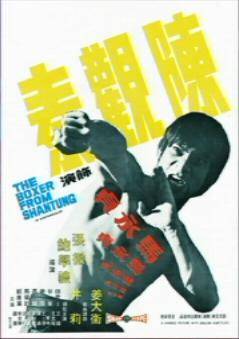Plot
Boxer from Shantung follows Ma Yongzhen and Xiao Jiangbei. Ma and Xiao are manual laborers busting their tails in Shanghai at the beginning of the film, and Ma's first encounter with the crime lord Tan Si - who shares power in the city with Boss Yang, who has the Four Champions fighting for him - starts him off on the underworld influence ladder. Step by step, he earns the respect of everyone he meets, either with his strength of character or by beating them up. When he gets a really big break by defeating a Russian strongman, he indulges himself in a fancy cigarette holder, much like the one Tan Si uses. However, he is mindful of his humble beginnings, and of the fact that times are still tough for many in Shanghai. He shares his good fortune with his old fellow wage slaves, and when they assist him in his various extralegal activities, he lectures them on the futility of trying to extort money from people who simply don't have any to spare.
The tea house that Ma and his underlings frequent employs a singer, Jin Lingzi, and her uncle, who provides the music. Ms. Jin's hopes that Ma's arrival will mark a turn for the better for conditions in the crime-plagued city are dashed when she ascertains that he isn't different enough from the other bosses she's seen rise and fall. She begins contemplating leaving the city.
Tan Si is ambushed and killed by Boss Yang. Ma finds Tan Si's body and is subsequently invited by Boss Yang to discuss business in a restaurant. Ma's followers warn him that Ma might be ambushed during the meeting. Ma decides to go anyway. He calls his friend and cart driver Xiao Jiangbei, gives him 100 dollars to leave the city as he is worried about his friend, who is too friendly and naive for the gangster lifestyle. In the restaurant, Yang has all the waiters and customers thrown out and replaces them with his own men. Ma arrives, observes the situation and slowly starts the conversation with Yang. He quickly tells Yang that he only came to the meeting to kill Yang. Suddenly the men Yang had placed in the restaurant start attacking Ma und hurt him with an Axe, that gets stuck in his torso. Despite his injury Ma - with the help of his own men, who arrived to help their boss - fights all of Yang's men and incapacitates them -including the four champions. Ma then kills Yang. One of Yang's men, who has survived the fight, attacks Ma and kills him. Ma's killer is then finished off by Ma's men.
The film ends with Jin Lingzi, her uncle and Xiao Jiangbei leaving Shanghai on a train.
This page is based on this
Wikipedia article Text is available under the
CC BY-SA 4.0 license; additional terms may apply.
Images, videos and audio are available under their respective licenses.
